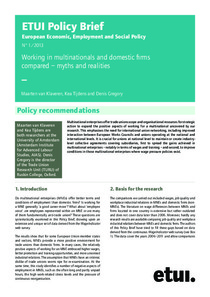Working in multinationals and domestic firms compared – myths and realities

van Klaveren, Maarten ; Tijdens, Kea G. ; Gregory, Denis
European Trade Union Institute, Brussels
ETUI - Brussels
2013
7 p.
collective bargaining ; conditions of employment ; European works council ; labour relations ; multinational enterprise ; trade union ; wages ; workers participation
ETUI Policy Brief. European Economic, Employment and Social Policy
1/2013
Labour relations
English
2031-8782
" The three authors of this policy brief investigated whether multinational enterprises (MNEs) offer better terms and conditions for employment than domestic (non-MNE) firms. Using data from the WageIndicator web survey (www.wageindicator.org), the researchers compared wages, working conditions and job quality, working hours, training possibilities, and industrial relations at the workplace in MNEs and domestic companies.
Their conclusions show that, for some EU member states and sectors, working for an MNE provides a more positive environment in the form of higher wages, better promotion and training opportunities, and more unionized industrial relations. The negative aspects of working for MNEs, on the other hand, include long and partly unpaid working hours, high stress levels and pressure of continuous re-organisation.
Last but not least, the policy brief formulates a few relevant policy recommendations for trade unions and European Works Councils. "
Digital
The ETUI is co-funded by the European Union. Views and opinions expressed are however those of the author(s) only and do not necessarily reflect those of the European Union or the ETUI.